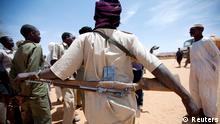On July 31, 2007 the United Nations Security Council decided to
send peacekeepers to Darfur. Five years on, analysts say the mission
failed to meet its objectives as the humanitarian situation continues to
deteriorate.
The conflict in Sudan's Darfur region has been going on for nine years.
When it began, pictures of Janjaweed armed militias on camels hunting
down opponents and civilians were to be seen in papers and newscasts
worldwide People were outraged by the pictures but no concrete action
was taken until late 2007. This was the time when 20,000 UN peacekeeping
troops were deployed in Darfur after the United Nations learned that
the conflict had left 300,000 people dead.
But since then,the situation hasn't improved, says Anne Bartlett, a
sociology professor at the University of Chicago who has been following
the Darfur conflict for years. She is the head of an NGO that promotes
sustainable development in Darfur. She has also worked as a UN
negotiator.

Numerous rebel groups in Darfur have different interests and ideologies
"The peacekeeping mission failed to reach the intended goal of
protecting the people," Bartlett criticized. She argues that the United
Nations should increase its forces.
"For safety reasons, most of the aid agencies have pulled out of
Darfur. There is almost no humanitarian provision and there is very
little protection. The situation has considerably deteriorated, in my
opinion," Barlett told DW.
Many actors, many fronts
The situation in Darfur is complex. Initially, rebel groups fought for a
greater voice against the Sudanese government and the militias it
financed. But today there are several other fronts. Rebel groups fight
the government but also each other. Groups with different ethnic
backgrounds fight for territory and political influence. Farmers and
nomads fight over resources and criminal gangs also operate in Darfur.

Anne Bartlett says the UN mission failed to protect the people
Experts criticise the Sudanese government for sabotaging the peace
building process. They believe that the ruling government is reluctant
to give up power.
The International Criminal Court has issued an arrest warrant against
President Omar al-Bashir, on charges of genocide in Darfur. The Sudanese
foreign minister's state secretary, Rahmat Allah Mohammad Othman,
believes that the accusation is politically motivated and denies claims
that the humanitarian situation in Darfur has deteriorated.
"I myself was in Darfur two weeks ago. No one complained about the
humanitarian situation," Othman told DW. "Maybe they are confusing
Darfur with other countries or another part of Sudan."
Tough peace negotiations
Othman also dismisses claims that Sudan still supplies arms to Darfur
despite a UN embargo. In an exclusive interview with DW, the UN Special
Representative and Chief of Mission in Darfur, Ibrahim Gambari,said, "
obviously there are weapons , when there is fighting between the
government and armed groups."
Gambari has considerable experience in how to talk to an autocratic
leader. He has worked for Nigerian President Abacha and was a guest at
the wedding of Chadian President Deby. As a United Nations negotiator,
he negotiated for the UN with Zimbabwe's President Mugabe and Burma's
former head of state Shwe.

Ibrahim Gambari is the UN Special Representative and Chief of Mission in Darfur
A prerequisite for a successful peace agreement is the cessation of hostilities.
"The only way to reach a comprehensive and a conclusive peace agreement
is to commit the government and the armed movements in the cession of
hostilities and cease fire," Gambari said.
UN troops should be reduced
The peace negotiations between rebel groups and the government have
proven to be extremely complicated. On the rebel side, several groups
have different interests and ideologies. In 2011, a peace agreement was
signed – but only by one rebel group and the government. Ibrahim
Gambari, however, is convinced that the United Nations will continue its
negotiating efforts and extend its mandate for another year.
But he does not agree with increasing the numbers of UN personnel in
Darfur. "The security situation has improved in many parts of Darfur, "
said Gambari. "We can therefore reduce the number of troops, without
undermining the gain that we have made in contributing to security
stability in Darfur."
In the meantime the UN Security Council has extended for a year the
mandate of the UN and African Union peacekeeping force in Darfur. It
also reduced the forces from 22,445 personnel to about 16,000.
Click here to read this on Deutsche Welle

 Numerous rebel groups in Darfur have different interests and ideologies
Numerous rebel groups in Darfur have different interests and ideologies Anne Bartlett says the UN mission failed to protect the people
Anne Bartlett says the UN mission failed to protect the people Ibrahim Gambari is the UN Special Representative and Chief of Mission in Darfur
Ibrahim Gambari is the UN Special Representative and Chief of Mission in Darfur















































